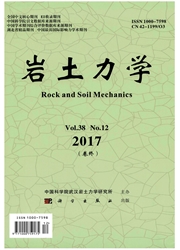

 中文摘要:
中文摘要:
针对目前钻芯取样、标准贯入试验、荷载试验等水泥搅拌桩的检测方法试验要求高、试验时间长、测试费用高等诸多缺点,提出联合测定水泥土初期pH值与电导率的方式来判断其后期无侧限抗压强度与混合土性状的方法。以上海地区第④层黏性土为研究对象、以水泥掺量为变量,对加固土体的化学性质与其强度增长特性做了试验研究;探讨了pH值和电导率与水泥掺量、养护时间、后期强度之间的关系。试验结果表明,当水泥土初期的pH值和电导率大于分别为11.5和0.09s/m的临界值时开始产生强度。在此之后强度随着pH值的增长而缓慢增加,但当pH达到11.8时,强度开始随着pH值的增长而迅速增加。电导率与强度变化关系的这些特征可以避免用水泥土初期pH值单一化学指标来判定其后期无侧限抗压强度带来的误差与风险。为判定上海地区黏性土水泥搅拌桩的强度提供试验依据。
 英文摘要:
英文摘要:
Drilling core samples, standard penetration test, and load test are common methods for checking the quality of soil-cement columns in China. They have disadvantage of high requirements and ineffective in time and test cost. Because of these reasons, a new method for checking the strength of soil-cement columns is proposed. The method includes measurement of the pH value and the electrical conductivity at the initial stage to determine the unconfined compressive strength and the characteristics of cement treated soil. In this study, the fourth layer of Shanghai clayey soil is used. The cement content of variables, cement treated soil's chemical properties and strength characteristics researching tests were done. The relationship among pH value, electrical conductivity, and cement content, curing time, unconfined compressive strength are investigated. Test results show that when pH value and the electrical conductivity at initial stage are larger than 11.5 and 0.09 s/m respectively, cement treated soil starts to get strength. After that, the strength grows with the increase of pH value slowly. However, when pH value reaches 11.8, the strength grows with the increase of pH value rapidly. Characteristics of relationship between electrical conductivity and strength can avoid inaccuracy and risks brought by using single chemical index to determine the unconfined compressive strength. These results can provide a test basis for the judgment of the strength of cement treated Shanghai clayey soil.
 同期刊论文项目
同期刊论文项目
 同项目期刊论文
同项目期刊论文
 Experimental investigation of influence of acid rain on leaching and hydraulic characteristics of ce
Experimental investigation of influence of acid rain on leaching and hydraulic characteristics of ce Investigation of field-installation effects of horizontal twin-jet grouting in Shanghai soft soil de
Investigation of field-installation effects of horizontal twin-jet grouting in Shanghai soft soil de Engineering properties of recycled Calcium Carbide Residue stabilized clay as fill and pavement mate
Engineering properties of recycled Calcium Carbide Residue stabilized clay as fill and pavement mate Long-term settlement behavior of ground around shield tunnel due to leakage of water in soft deposit
Long-term settlement behavior of ground around shield tunnel due to leakage of water in soft deposit 期刊信息
期刊信息
